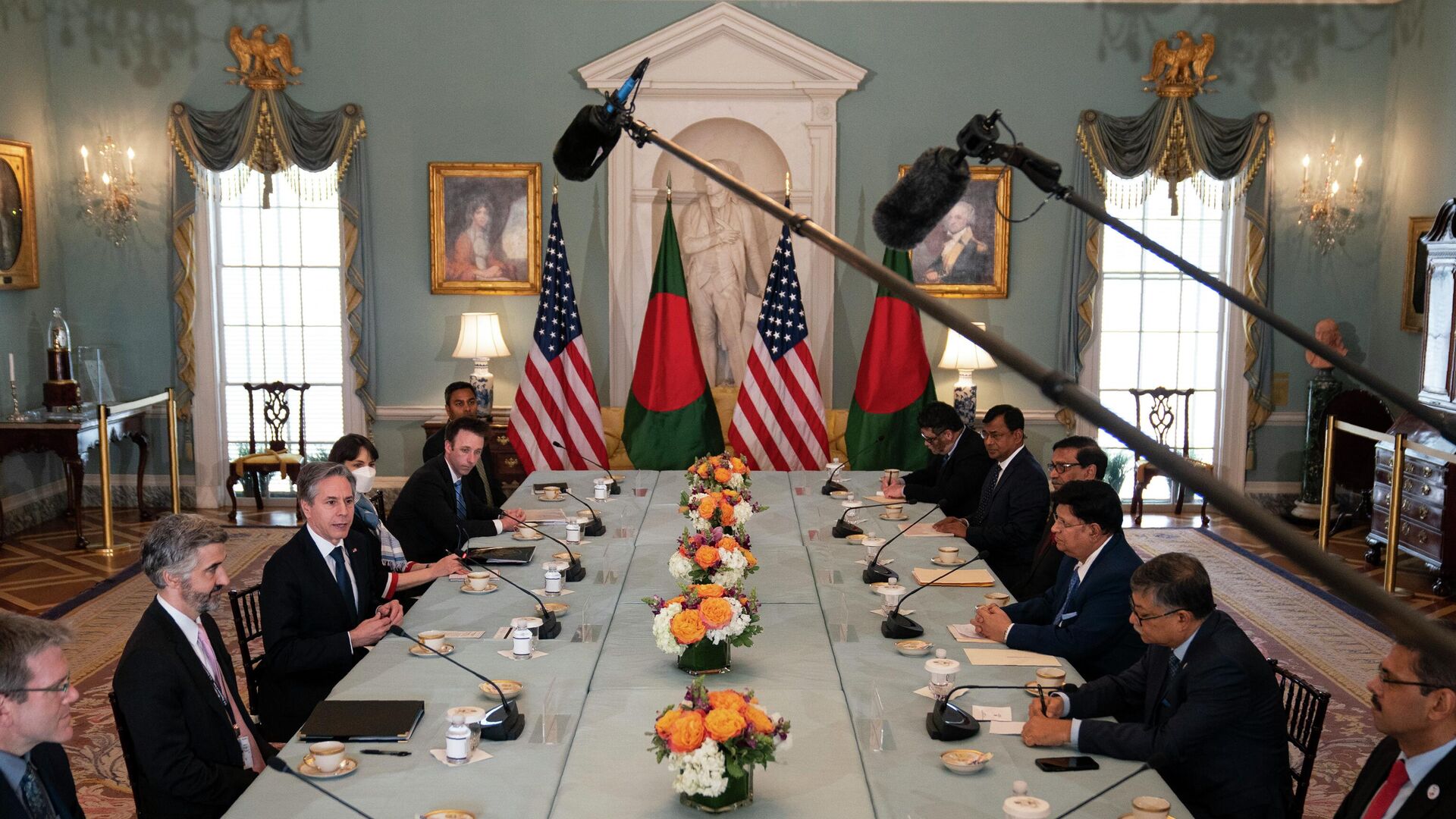US Trying to Lure Bangladesh Into 'Indo-Pacific Economic Framework' Despite Warnings From China
10:34 GMT 03.06.2022 (Updated: 18:35 GMT 19.10.2022)

© AP Photo / Evan Vucci
Subscribe
The US has said that the Indo-Pacific Economic Framework (IPEF) will lend “shape and coherence to the economic pillar of our Indo-Pacific Strategy”. China, the largest economy of the Asia-Pacific region, has questioned the American intention of excluding it from the pact, which it says undermines “regional cooperation”.
The US is trying to include Bangladesh in the Indo-Pacific Economic Framework (IPEF) while ignoring Chinese concerns about such a move.
Bangladesh has “welcomed additional information” on the IPEF recently launched by the US after officials from the South Asian nation were briefed about the economic pact by their American counterparts on Thursday, an official statement said.
The meeting took place as the US seeks to enlist more nations in the Asia-Pacific region for the IPEF, which at present comprises 14 “founding members”—Fiji, Australia, Brunei Darussalam, India, Indonesia, Japan, Malaysia, New Zealand, the Philippines, Singapore, South Korea, Thailand, the United States, and Vietnam.
Negotiations for the US-led pact were launched on the sidelines of the Quad Leaders’ Summit in Tokyo last month.
According to a press release issued by the US State Department after the "Second US-Bangladesh High-Level Economic Consultation" in Washington, Dhaka has evinced interest in initiatives under the IPEF, which seek to promote “supply chain resilience” and “decarbonisation” in the Asia-Pacific region.
The bilateral consultations were attended by Jose W. Fernandez, the US under secretary of state for economic growth, energy, and the environment and Salman F. Rahman, an adviser to Bangladesh’s Prime Minister Sheikh Hasina.
“Bangladesh also sought US technical assistance to sustainably explore its ocean resources and further develop its blue economy in pursuit of environmental protection and economic prosperity”, the joint press release stated.
“Both countries share a common vision of a free, open, inclusive, peaceful, and secure Indo-Pacific region with shared prosperity for all”, it also said.
During the meeting, Dhaka “expressed interest” in receiving assistance from the International Development Finance Corporation (DFC), a federal US agency, in order to fund infrastructure projects in Bangladesh.
IPEF Promotes ‘Exceptionalism’ and ‘Bloc Confrontation’, Beijing Tells Dhaka
The high-level economic consultations took place a day after Beijing cautioned Dhaka against the IPEF during a meeting between Liu Jinsong, the director-general of the Department of Asian Affairs at the Chinese Foreign Ministry, and Mahbub Uz Zaman, Dhaka’s envoy to Beijing, on 1 June.
“The logic behind the US Indo-Pacific strategy, AUKUS, the Quad grouping and the latest Indo-Pacific Economic Framework is US centrism and exceptionalism”, the Chinese official told the Bangladeshi diplomat.
“Unipolar hegemony wins no support, block confrontation has no future, and building small yards with high walls and decoupling from or cutting off supply chains will bring no good to anyone”, Liu also remarked in the meeting.
Further, Beijing urged Dhaka to “uphold independence” and reject “bloc politics” in order to preserve “hard-won peace and development” in the Asia-Pacific region.
At present, Bangladesh is China’s largest two-way trading partner and also ceded to the One Belt One Road (OBOR) initiative in 2016.
Beijing has maintained that the IPEF is meant at “undermining” regional cooperation in the Asia-Pacific region.
Previously, Chinese State Counsellor and Foreign Minister Wang Yi also criticised the US’ new economic plan while on a visit to Fiji on 30 May.
“The so-called Indo-Pacific Economic Framework recently rolled out by the US claims to build a free, open, and inclusive new order, but how can any economic frame call itself free if it doesn't lower tariffs?" Wang asked.
"How can it be called inclusive if it purposefully excludes China, the largest market in the region and in the world?" the Chinese foreign minister questioned further.

